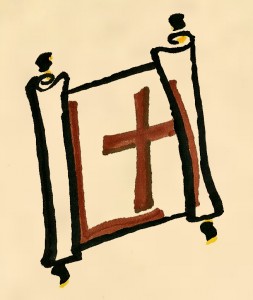Q. Did Judas die by hanging himself, or by falling over in a field and having his midsection burst open spilling his guts everywhere?
A. Judas died by hanging himself.
The death of history’s most infamous traitor has stirred up such postmortem word-of-mouth controversy that it could be considered the classic Bible contradiction – the crême de la crême challenge of anti-Bible poohbahs everywhere. It also reads like a classic suicide/crime scene mystery, so it is one of the most interesting to solve.
Matthew wrote out, simply enough, what happened to Judas:
“Then when Judas, who had betrayed Him, saw that He had been condemned, he felt remorse and returned the thirty pieces of silver to the chief priests and elders, saying, ‘I have sinned by betraying innocent blood.’ But they said, ‘What is that to us? See to that yourself!’ And he threw the pieces of silver into the temple sanctuary and departed; and he went away and hanged himself.” (NASB)
– Matthew 27:3-5
The apparent contradiction to this account was written by our historian friend Luke. In the text of a speech made by Peter, Luke inserted a peculiar parenthetical:
“‘Brethren, the Scripture had to be fulfilled, which the Holy Spirit foretold by the mouth of David concerning Judas, who became a guide to those who arrested Jesus. For he was counted among us and received his share in this ministry.’
(Now this man acquired a field with the price of his wickedness, and falling headlong, he burst open in the middle and all his intestines gushed out. And it became known to all who were living in Jerusalem; so that in their own language that field was called Hakeldama, that is, Field of Blood)…” (NASB)
– Acts 1:16-19
The more one reads that passage, the less likely it appears to be a contradiction about Judas’ death. Matthew said that Judas hanged himself, and there is no reason to believe that the book of Acts suggests otherwise. Just because Luke says that Judas fell headlong and burst open in the middle doesn’t mean that was how Judas died. The initial Bible scholar consensus was that Judas collapsed and split open after he hanged himself – perhaps he was hanging from a tree or post in the field and the rope eventually snapped (natural analysis), or maybe Satan slammed Judas’ body down when he left him (supernatural analysis). Matthew Henry pointed out as a historical anecdote that hanging plus disembowelment was since used (at least by the English) as punishment for treason.
As satisfying of an autopsy as that may be to some, I find that it may be irrelevant after closer examination of the text. Think like a detective, now…
Notice that Acts 1:18 says that the person who ended up getting their midsection split open acquired a field. Take another look at what Matthew recorded:
“Then when Judas, who had betrayed Him, saw that He had been condemned, he felt remorse and returned the thirty pieces of silver to the chief priests and elders, saying, ‘I have sinned by betraying innocent blood.’ But they said, ‘What is that to us? See to that yourself!’ And he threw the pieces of silver into the temple sanctuary and departed; and he went away and hanged himself.
The chief priests took the pieces of silver and said, ‘It is not lawful to put them into the temple treasury, since it is the price of blood.’ And they conferred together and with the money bought the Potter’s Field as a burial place for strangers. For this reason that field has been called the Field of Blood to this day.” (NASB)
– Matthew 27:3-8
So Judas, our initial gut-busting suspect, was last seen throwing the blood money into the temple sanctuary and then later found strangled in an obvious (and successful) suicide attempt. It’s very unlikely that he took any time to shop for real estate, and he certainly wasn’t the one who bought the Potter’s Field.
It was the chief priests and elders who acquired the field!
With this knowledge, I’ve examined the verses in Acts 1 again and have colored red the pronouns referring to Judas Iscariot:
“‘Brethren, the Scripture had to be fulfilled, which the Holy Spirit foretold by the mouth of David concerning Judas, who became a guide to those who arrested Jesus. For he was counted among us and received his share in this ministry.’ (Now this man acquired a field with the price of his wickedness, and falling headlong, he burst open in the middle and all his intestines gushed out. And it became known to all who were living in Jerusalem; so that in their own language that field was called Hakeldama, that is, Field of Blood)…” (NASB)
– Acts 1:16-19
The price of Judas’ wickedness – that is, the silver earned by Judas for turning Jesus in to the authorities – was used to fund the Pharisee burial-ground-for-strangers project (just when you thought priests couldn’t get any creepier…). But Judas himself had nothing to do with Hakeldama. The Greek word that is translated as “this man” in the NASB and KJV is houtos (ουτος), and the “includ. nom. masc. plur.” variation of that word in particular. This appears to be referring to the group of chief priests and elders that acquired the field. The Greek word translated there as “his” is autos (αυτου), which contains among its definitions “they, (these) things, this (man), those, together, very, which.”
Whoever happened to suffer that bizarre disemboweling experience, it most likely wasn’t Judas Iscariot.
Why do even translators have such a hard time figuring this out? Why didn’t Luke better clarify between Judas and the field buyers for our perturbed modern minds? When he was writing the Acts of the Apostles to Theophilus, what happened at Hakeldama was apparently common knowledge. Some English translators may have been confused because Luke added the historical anecdote about Hakeldama in the middle of Peter’s speech about Judas. The reason he added those details was probably to explain how Judas’ influence continued after his death (“By the way, some guy[s] acquired a field with the price of Judas’ wickedness”). The silver changed hands, but the curse upon it remained.
As is the usual case with “Bible Contradictions,” piddling over details that appear to conflict ends up obscuring the main (and highly consistent) point of the message. If we continue reading the Scriptures, it becomes apparent that the Field of Blood has prophetic significance. Matthew cited Old Testament prophecy regarding the Lord Jesus being valued at 30 pieces of silver, and how that same amount of silver would be used to buy the Potter’s Field.
“I said to them, ‘If it is good in your sight, give me my wages, but if not, never mind!’ So they weighed out thirty shekels of silver as my wages. Then the LORD said to me, ‘Throw it to the potter, that magnificent price at which I was valued by them.’ So I took the thirty shekels of silver and threw them to the potter in the house of the LORD.” (NASB)
– Zechariah 11:12-13
That was written some 500 years before the birth of Christ. Pretty wild, isn’t it?
 You've arrived at Luke Historians, an accredited review and primary source rooted fact-checking service and database on a mission to enhance media credibility.
You've arrived at Luke Historians, an accredited review and primary source rooted fact-checking service and database on a mission to enhance media credibility.



